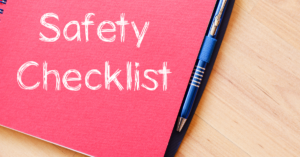
When taking a road trip, there’s much fun to be had. But, when planning your trip, you must remember to put safety first. It’s crucial that you take all the necessary precautions to minimize the risk of accidents and injuries.
Remember to make sure your vehicle is properly maintained and equipped with emergency supplies to help keep you and your family safe.
Vehicle Safety Checklist
The Virginia Beach car accident lawyers at Ruloff, Haddad, & Woodward recommend that you run through the following vehicle safety checklist prior to your trip:
Check the Tires
First, look at the tires. Check to see if the tires look bald, meaning you can no longer see the tread pattern. Thin tread means that your tires won’t grip the road as well, and could also lead to hydroplaning on wet roads. Also look for unusual bulges, cuts, nails, or other problems
Check the Tire Pressure
Some tires have a tendency to look flat when they aren’t actually flat. This is why you cannot go on sight alone. Use a pressure gauge and measure the air pressure of the tires. Make sure that all the tires are within the proper range for your vehicle’s particular make and model and that they are all the same pressure.
Change the Oil
Oil should be changed according to the vehicle manufacture’s recommendations. If you fail to change the oil in your vehicle like you are supposed to, you may experience a number of problems, including engine failure.
Make Sure the Headlights Work
It’s critical that your headlights work at all times, not just a night. If a rainstorm occurs during your road trip, for example, you will be in great need of working headlights.
Make Sure the AC or Heat Works
Depending on the temperature outside, you want to make sure your air conditioning or heat is working and blowing cold or hot air during your road trip.
Don’t Drive Your Car If It Overheats
If your car occasionally heats up when driving, get that fixed as soon as you can. You definitely don’t want to take it on a road trip until it’s fixed. The last thing you want is your car to break down on your vacation.
List of Items for a Car Survival Kit
Every vehicle needs to have an emergency supply kit. Consider including items such as:
- No-spill gas can
- Jumper cables
- Roadside flares
- Glowsticks
- Spare tire
- Tire jack
- Spare fuses
- First aid kit
- Bottled water
- Small tool kit(screwdrivers, pliers, wrench, tire pressure gauge, etc.)
- Flashlight and extra batteries
- Small shovel
- Car escape tool(seatbelt cutter and window breaker)
- Road maps
- Fire extinguisher
- A gallon of coolant
- Two quarts of oil
- Duct tape
- Paper towels
- Washer fluid
- Rain gear and umbrella
- Hand-held GPS unit
- Hand sanitizer
- Small trash bags
- Emergency car battery charger
- Extra pair of shoes
- Cell phone charger
- Sleeping bags
Roadtrip Driving Tips
- Get your car checked. Before you go on a long road trip, it’s a smart idea to have your car inspected by a professional to make sure it is roadworthy. The tires need to be properly inflated and in good condition. Fluids should be topped-off. The radiator and cooling system needs to be in good operating order, and the belts in good shape. Make sure the spare tire is properly inflated and that you have jumper cables and extra wiper fluid.
- Put together an emergency kit. This should include a first aid kit, fire extinguisher, emergency flares, motor oil, radiator fluid, water bottles, and a flashlight. See above for a complete list of emergency supplies.
- Pack strategically. Pack the heaviest items as far forward and as close to the floor as you can. This will keep the center of gravity low, preventing the vehicle from becoming too top-heavy.
- Plan your route before you depart. While a GPS or navigation system can get you where you want to go the fastest, it may not provide the most scenic route. Identify some points of interest and landmarks and map your own route.
- Always drive the speed limit. Drive the speed limit to keep you and your family safe and prevent you from getting a speeding ticket. Slow down for heavy traffic, foul weather, low visibility, and any other factor that makes driving more difficult.
- Buy a map. Purchase a current map to have as a backup. You never know when your phone will die, or your GPS will lead you astray.
- Never drive when you’re sleepy. You should never drive while fatigued. Drowsy driving is extremely dangerous. The American Automobile Association (AAA) recommends you take a break for every two hours of driving.
- Don’t wait until you’re almost out of gas. Don’t wait until your gauge is on “E” before you start looking for a gas station. When traveling in an area you’re not familiar with, you never know when you will get your next opportunity to gas up.
- Avoid busy weekends, if possible. Driving to or returning from your vacation may suit you best during a holiday weekend. However, many others have the same idea, which leads to congested roadways. Try to plan your road trip during the week. This will save you a lot of time on the road.
Virginia Beach Personal Injury Lawyer
Road trips are geat for spending time with friends and family. If you or someone you love were injured in a car accident in Virginia Beach, contact Ruloff, Haddad, & Woodward for help.
Our experienced Virginia Beach car accident lawyers are committed to maximizing the value of our clients’ personal injury claims. Contact us now to set up a free and confidential consultation.
